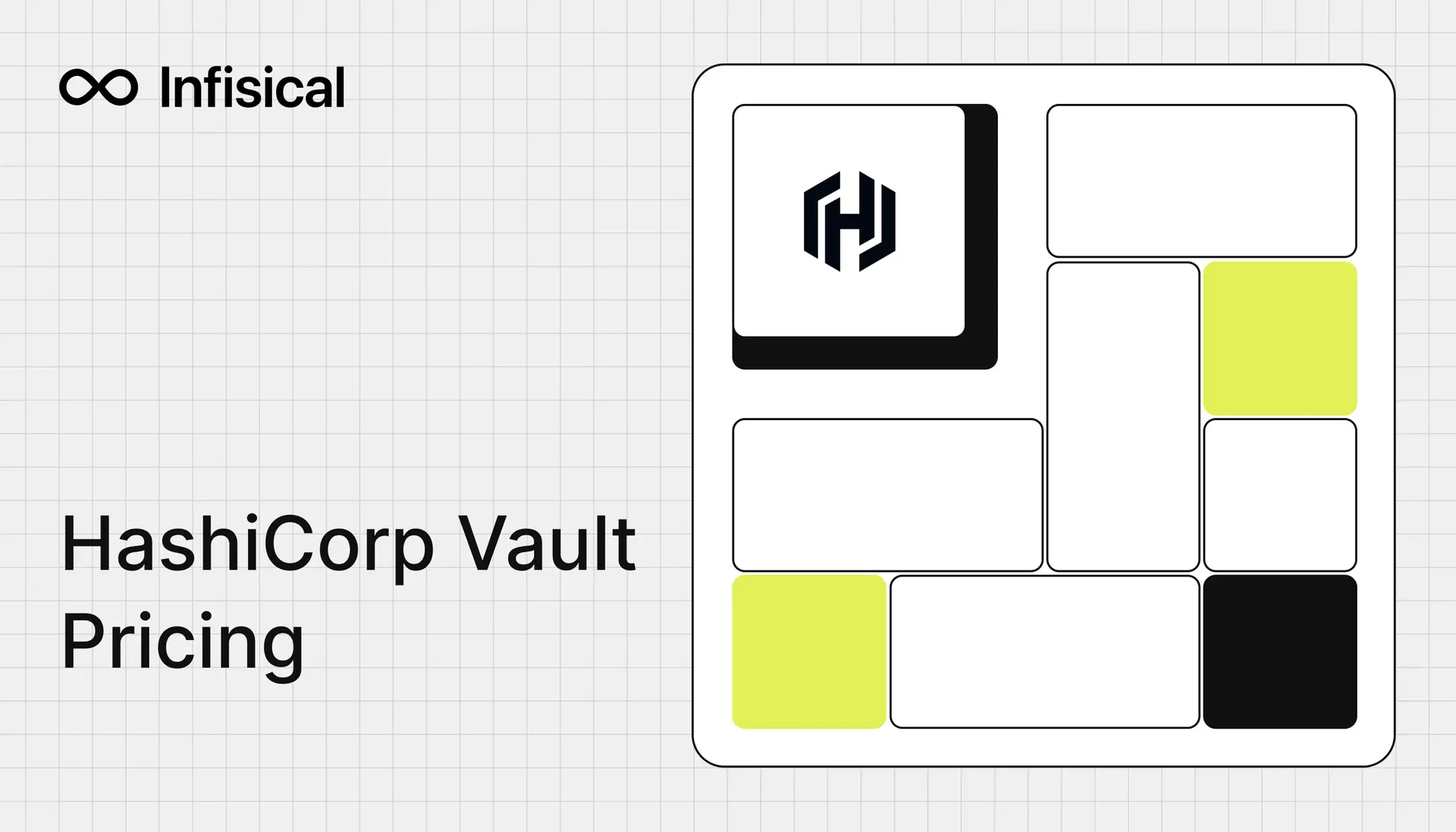
What is Hashicorp Vault?
HashiCorp Vault is a secrets management solution that provides centralized storage and secure access control for sensitive data including passwords, API keys, encryption keys, and certificates. It enables organizations to securely store, distribute, and regulate access to secrets throughout modern cloud infrastructure and applications. Although its source code remains publicly viewable, as of August 2023 Vault is no longer open-source software.
One key thing to understand is that HashiCorp offers two completely different products named Vault:
- HashiCorp Vault Secrets, and
- HashiCorp Vault Dedicated.
To further complicate matters, there is also HashiCorp Vault Enterprise, which uses the same binary as Vault Dedicated but caters to specific requirements in regulated industries (with absolutely no transparency regarding pricing).
Let's examine how these solutions differ in pricing and features.
Note: If you're seeking alternatives to Vault, you can read this article about HashiCorp Vault alternatives, or this one about the best secrets management tools. Whether you need an on-premises installation or a cloud SaaS product, Infisical might be the right solution for you.
HCP Vault Secrets (SaaS Only)
HashiCorp launched Vault Secrets in June 2023 as their first SaaS-only secrets management solution. Unlike their traditional open-source products, this cloud-exclusive offering comes in three tiers with distinct pricing and capabilities. Here's a comprehensive breakdown of the tiers:
| Feature | Free Tier | Standard Tier | Plus Tier |
|---|---|---|---|
| Price per secret per month | Free | $0.50 | $0.95 |
| Price per secret access API operations | Free up to 10,000 | $0.10 per per 10,000 | $0.10 per per 10,000 |
| Secret and application limits | Up to 25 secrets and 25 applications | Up to 2,500 secrets and 1,000 applications | Up to 25,000 secrets and 10,000 applications |
| Versions per secret | Up to 5 versions | Up to 50 versions | Up to 50 versions |
| Secret sync destinations | Up to 5 | Up to 200 | Up to 2,000 |
| Auto-rotating secrets | No | No | Up to 5,000 |
| Dynamic secrets | No | No | Up to 5,000 |
| Support level | Community | Silver | Gold |
Vault Secrets Limitations
The Free tier is only really suitable for "small projects or proof of concepts", and teams typically need to upgrade to paid plans for any serious production use. Both Standard and Plus tiers offer pay-as-you-go and annual billing options, with pricing based on the number of secrets and API operations.
It's important to note there are significant limitations affecting all tiers. Most notably, all tiers face strict rate limits of 6,000 secret access requests per minute and 2,000 requests for other API operations. Integration options are also surprisingly limited, with only 7 available in the Standard tier (HCP Terraform, AWS, Azure, Google Cloud Platform, Kubernetes, GitHub and Vercel) and 10 in the Plus tier.
Resource restrictions further constrain the service's scalability. Each project is limited to 100 apps, and individual apps can only manage 300 secrets, 10 dynamic secrets, and 15 syncs.
For organizations evaluating Vault Secrets, it's crucial to understand that these constraints might force architectural compromises or require multiple projects to accommodate larger deployments. While the service offers a polished SaaS experience, its current limitations make it most suitable for small to medium-sized projects rather than enterprise-scale deployments.
These limitations make Vault Secrets a challenging choice for larger projects or growing organizations that require more flexibility.
HCP Vault Enterprise (Self-Hosted)
Vault Enterprise is HashiCorp's bespoke solution designed for enterprises in highly regulated industries with specific security, compliance, and operational requirements. It is divided into three distinct tiers, Standard, Plus and Premium each offering different features.
Vault Enterprise provides disaster recovery capabilities to minimize downtime and data loss during system failures. It also enables replication across multiple data centers, improving the availability and reliability of secrets management operations for global enterprises.
While all tiers receive the highest level of support, certain capabilities vary by tier. For example, multi-factor authentication is not available in the Standard version, and Secret sync functionality is exclusive to the Premium tier.
Enterprise pricing is largely hidden. It is very custom depending on your company's needs and can only be decided after talking to Hashicorp's sales team.
It is worth mentioning that Hashicorp is known for increasing prices after the first year of using their products. This can be seen here among other forums online.
HCP Vault Dedicated (Managed Version)
HCP Vault Dedicated is a managed, cloud-hosted version of Vault providing a single-tenant environment, ensuring that the infrastructure is exclusively used by only one customer. This solution includes automated backups, scalability options, direct support from HashiCorp experts and regions, which helps in complying with data residency regulations.
It is important to note that there is no direct transition from the Hashicorp Vault Secrets to Hashicorp Vault Dedicated. As said earlier, those should be considered as completely separate products (which can also be seen on the Hashicorp Web Dashboard).
There are three base configurations in HashiCorp Vault Dedicated:
Development
- Starts at $21.60/month (billed hourly)
- Up to 25 clients
- Not suitable for production: according to Hashicorp, this tier is only suitable for development and testing purposes as it does not scale
- Cluster size: 2 vCPU | 1GiB RAM
Starter
- Starts at $360/month (billed hourly)
- Up to 25 clients
- Vault Enterprise with Namespaces + Auditing & Backups
- Cluster size: 2 vCPU | 8 GiB RAM
Standard
-
Starts at $13,823/year (billed hourly)
-
Base price scales with cluster size:
- 2 vCPU, 8 GiB RAM: $13,823/year
- 4 vCPU, 16 GiB RAM: $27,708/year
- 8 vCPU, 32 GiB RAM: $65,604/year
-
Additional clients: $1,349/year each
-
99.9% SLA with Silver Support
Plus
-
Starts at $16,145/year (billed hourly)
-
Base price scales with cluster size:
- 2 vCPU, 8 GiB RAM: $16,145/year
- 4 vCPU, 16 GiB RAM: $32,342/year
- 8 vCPU, 32 GiB RAM: $82,397/year
-
Additional clients: $1,349/year each
-
Includes cross-region performance replication, sentinel policies, and control groups
Should you use Hashicorp Vault?
-
Hashicorp Vault is considered of the most advanced secrets management products on the market.
-
Hashicorp Vault does not have a free tier (outside of Hashicorp Vault Secrets which is a different product), which can make it harder to be adopted by smaller companies. The cheapest production-ready tier starts at $13,823/year.
-
Hashicorp Vault's pricing may become completely unaffordable depending on the total number of clients you have – especially for companies that use Kubernetes and have a large number of microservices.
-
Enterprise pricing is not available on the website and requires talking to a sales representative. Hashicorp is known for increasing the pricing at every contract resigning.
Hashicorp Vault Alternative: Infisical
Infisical is an open source full-fledged secrets management platform (16,000+ GitHub stars). It helps you organize your secrets in a single end-to-end encrypted storage. From there on, you are able to distribute secrets wherever you need them:
- Locally as a replacement for .env files (automatically pull the latest version of secrets using Infisical CLI without any manual syncing needed).
- Into your CI/CD and production-level 3rd-party tools using Infisical's automatic integrations (e.g., Circle CI, GitHub Actions, Vercel, AWS).
- Into the infrastructure tools that you might already be using (e.g., Docker, Kubernetes, Terraform, Ansible).
- In production environment using SDKs, API, Infisical Agent, etc.
On top of that, Infisical provides a complete suite of features, including:
- Approval workflows to review sensitive changes.
- Temporary access to give access to sensitive resources only temporarily .
- Automated code scanning capabilities to prevent hardcoding secrets and leaking those to git.
- And many more features that will make your secrets management a breeze.
Infisical is already trusted by top banks, pharmaceutical companies, government agencies, and other organizations that demand robust security and strict compliance standards.
If you want to read how Infisical compares to Hashicorp Vault, you can do so here.

Infisical Pricing
Infisical is free for teams up to 5 people. It includes all the integrations for free – whether it's an automatic sync to platforms like GitHub Actions, Vercel, Circle CI or a native integration with Docker, Kubernetes, Terraform.
If you need features like:
or you simply want to get a larger team onboard – you can upgrade to one of Infisical's paid tiers which start at just $18/month. If you need help figuring out the right tier, you can always schedule a quick call with us here.
F.A.Q
Is HashiCorp Vault free to use?
Yes, HashiCorp Vault Secrets (part of HashiCorp Cloud Platform, SaaS only) has a free tier, which is limited to:
- 25 static secrets,
- 25 applications,
- 5 secret syncs,
- 7 integrations
- 10,000 API calls / month
It's perfect for individuals and small teams looking to explore Vault's core features, but not suitable for production.
Is HashiCorp Vault expensive?
HashiCorp offers two main products: Vault Secrets (SaaS) and Vault Dedicated (single-tenant). Vault Secrets pricing starts at $0.50 per secret per month for production use, while Vault Dedicated has a minimum cost of $360 per month. While these base prices cover basic secrets management, many advanced features require higher-tier plans. For this reason, Vault typically represents a significant investment (both in time and money), even for larger organizations that require enterprise-grade security, collaboration capabilities, and dedicated support.
What is the difference between Vault Community and Enterprise?
Vault Community is free and provides the essential features for secrets management. Vault Enterprise is a bespoke solution designed for enterprises in highly regulated industries with specific security, compliance, and operational requirements. It comes with premium support and adds advanced capabilities like:
- High Availability (HA) clustering to ensure continuous operation even if a server fails.
- Disaster Recovery to protect against data loss in a disaster scenario.
- Replication to improve performance by distributing read-only workloads.
- Sentinel to enable fine-grained access control and policy enforcement.

